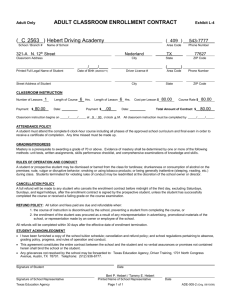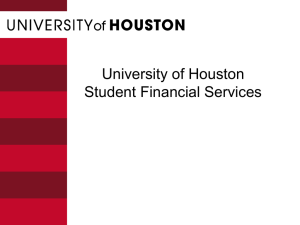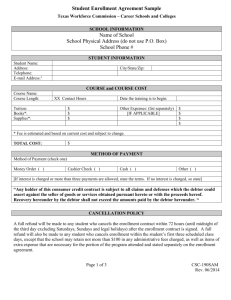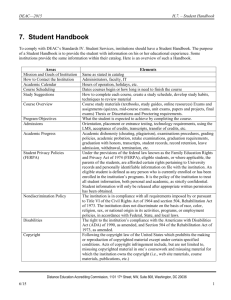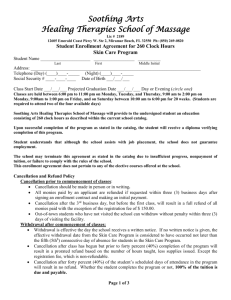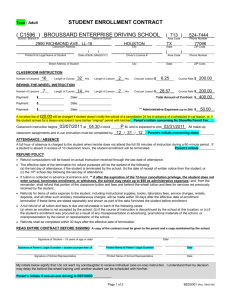H.2. Contracts - Distance Education and Training Council
advertisement
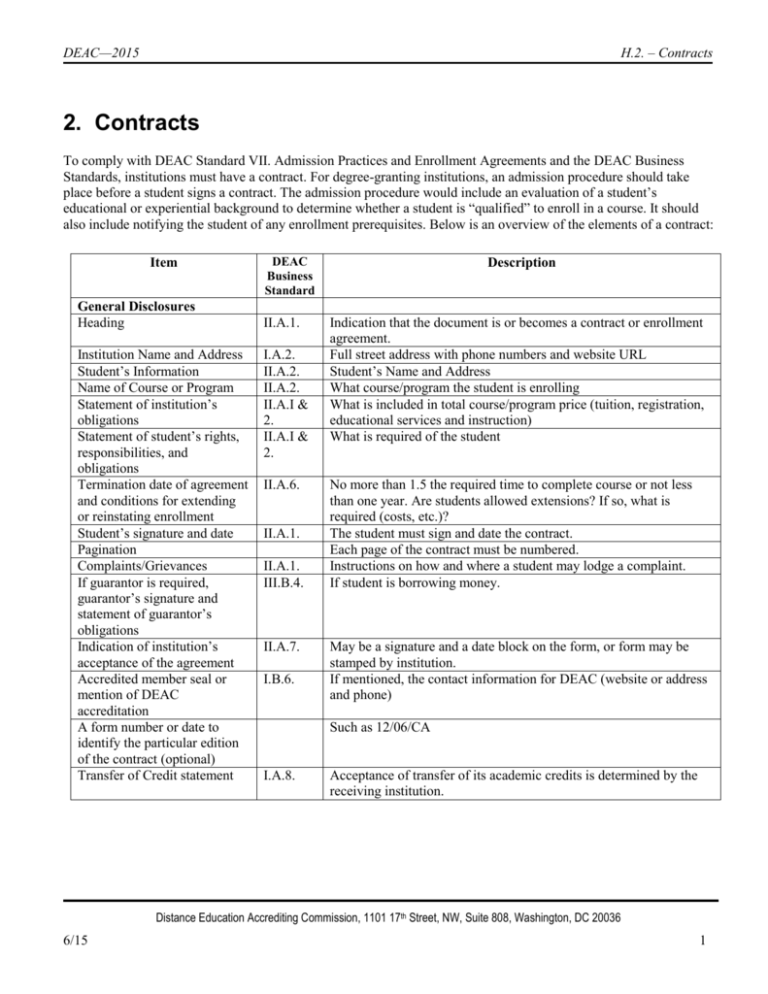
H.2. – Contracts DEAC—2015 2. Contracts To comply with DEAC Standard VII. Admission Practices and Enrollment Agreements and the DEAC Business Standards, institutions must have a contract. For degree-granting institutions, an admission procedure should take place before a student signs a contract. The admission procedure would include an evaluation of a student’s educational or experiential background to determine whether a student is “qualified” to enroll in a course. It should also include notifying the student of any enrollment prerequisites. Below is an overview of the elements of a contract: Item General Disclosures Heading Institution Name and Address Student’s Information Name of Course or Program Statement of institution’s obligations Statement of student’s rights, responsibilities, and obligations Termination date of agreement and conditions for extending or reinstating enrollment Student’s signature and date Pagination Complaints/Grievances If guarantor is required, guarantor’s signature and statement of guarantor’s obligations Indication of institution’s acceptance of the agreement Accredited member seal or mention of DEAC accreditation A form number or date to identify the particular edition of the contract (optional) Transfer of Credit statement DEAC Business Standard II.A.1. I.A.2. II.A.2. II.A.2. II.A.I & 2. II.A.I & 2. II.A.6. II.A.1. II.A.1. III.B.4. II.A.7. I.B.6. Description Indication that the document is or becomes a contract or enrollment agreement. Full street address with phone numbers and website URL Student’s Name and Address What course/program the student is enrolling What is included in total course/program price (tuition, registration, educational services and instruction) What is required of the student No more than 1.5 the required time to complete course or not less than one year. Are students allowed extensions? If so, what is required (costs, etc.)? The student must sign and date the contract. Each page of the contract must be numbered. Instructions on how and where a student may lodge a complaint. If student is borrowing money. May be a signature and a date block on the form, or form may be stamped by institution. If mentioned, the contact information for DEAC (website or address and phone) Such as 12/06/CA I.A.8. Acceptance of transfer of its academic credits is determined by the receiving institution. Distance Education Accrediting Commission, 1101 17th Street, NW, Suite 808, Washington, DC 20036 6/15 1 H.2. – Contracts DEAC—2015 Item DEAC Business Standard Tuition Policies Costs III.A.1. Optional Services III.A.2. Scholarship or grant III.A.3. Sample refund calculation III.A.4. Cancellations Notification of cancellation III.B.1. Cancellation period III.B.2. Cancellation before starting program III.B.3. Materials III.B.4. Promissory Notes III.B.5. Description All costs relative to the education provided by the institution are disclosed to the prospective student [on an enrollment agreement or similar contractual document] before enrollment. Costs must include tuition, educational services, textbooks, and instructional materials and any specific fees associated with enrollment such as application and registration fees, and fees for required services such as student authentication, proctoring, technology access, and library services. The costs for optional services, such as expedited shipment of materials, experiential portfolio assessment, or other special services such as dissertation binding are clearly disclosed to prospective students as not subject to refund after the five (5) calendar day student-right-to-cancel enrollment. A scholarship is disclosed as a bona fide financial grant to a qualified student and is awarded for a recognized purpose that includes specific criteria that must be met in order for a student to receive the scholarship. The institution’s disclosure of its refund policy must include a sample refund calculation that describes the calculation methodology using clear and conspicuous language. Student acknowledgement of the refund policy is obtained and documented on the enrollment agreement or similar contractual document prior to enrollment. A student’s notification of cancellation may be conveyed to the institution in any manner. (Exception: state laws) A student has five (5) calendar days after signing an enrollment agreement or similar contractual document to cancel enrollment and receive a full refund of all monies paid to the institution. A student requesting cancellation more than five (5) calendar days after signing an enrollment agreement put prior to beginning a course or program is entitled to a refund of all monies paid minus: a. an application/transfer credit evaluation fee of up to $75 and b. a one-time registration fee per program of no more than 20% of the tuition and not to exceed more than $200. Upon cancellation, a student whose costs for education are paid in full but not eligible for a refund is entitled to receive all materials, including kits and equipment. If promissory notes or enrollment agreements are sold to third parties, the institution ensures that it and any third parties comply with DEAC cancellation policies. Distance Education Accrediting Commission, 1101 17th Street, NW, Suite 808, Washington, DC 20036 2 6/15 H.2. – Contracts DEAC—2015 Refund Policies Refund policy III.C.1. Refund within 30 days III.C.2. Flexible Time Schedule Refund Policy (see Business Standards) III.C.3. Each institution must have and implement a fair and equitable refund policy in compliance with state requirements, or in the absence of such requirements, in accordance with DEAC’s refund policy standards under Section III.C.3. or Section III.C.4. below and disclosed on the enrollment agreement or similar contractual document. Any money due a student must be refunded within 30 days of a cancellation request, regardless if materials have been returned. a. Institutions that implement the Flexible Time Schedule Refund Policy must clearly disclose the curriculum benchmarks in terms of assignments submitted for grading that indicate completion at 10%, 25% and 50% intervals. b. When a student cancels after completing at least one graded assignment but less than 50% of the graded assignments, the institution may retain the application fee (not to exceed $75) and one-time registration fee of no more than 20% of the tuition (not to exceed $200), plus a percentage of tuition paid by the student in accordance with the following schedule: % completed by student Up to 10% >10%-25% >25%-50% >50%-100% Time-Based Term Refund Policy (See Business Standards) III.C.4. %returned 90% 75% 50% 0% %retained 10% 25% 50% 100% a. A Time-Based Term has beginning and ending dates for no more than 16 weeks in length. b. A Time-Based Term refund policy may be applied to any course, program or degree. c. Institutions that utilize the Time-Based Term Refund Policy must refund 100% of the tuition for any courses never started. d. Institutions that implement the Time-Based Term Refund Policy must clearly disclose the time-based refund schedule on the enrollment agreement. e. When enrolling students in an academic program of study comprised of two or more courses that award semester credit hours as defined in DEAC C.9. Policy on Degree Programs, institutions must treat each course separately for the purposes of calculating the appropriate amount of tuition refund owed to the student. f. When a student cancels enrollment the institution may Distance Education Accrediting Commission, 1101 17th Street, NW, Suite 808, Washington, DC 20036 6/15 3 H.2. – Contracts DEAC—2015 retain the application fee (not to exceed $75) and the onetime registration fee of no more than 20% of the tuition (not to exceed $200), plus a percentage of tuition paid by the student in accordance with the following refund schedule: Length of Term % returned to student AFTER 1-6 weeks 1st week – 70% 2nd week – 40% 3rd week – 20% 4th week – 0% 7-10 weeks 1st week – 80% 2nd week – 60% 3rd week – 40% 4th week – 20% 5th week – 0% 11-16 weeks 1st week – 80% 2nd week – 70% 3rd week – 60% 4th week – 50% 5th week – 40% 6th week – 30% 7th week – 20% 8th week – 10% 9th week – 0% Distance Education Accrediting Commission, 1101 17th Street, NW, Suite 808, Washington, DC 20036 4 6/15 H.2. – Contracts DEAC—2015 Refund policy for resident programs III.C. Refund Policy for Resident Courses/Programs: For a course/program that includes mandatory resident training, the costs for the distance study portion and the costs for the resident portion must be separately stated on the enrollment agreement. a. The distance study portion of the combination course/program must use the refund policy stated in III.C.3. or III.C.4. above. If the mandatory resident portion of the course/program is more than six (6) weeks, the institution may use the time-based refund policy in III.C.4. If the resident portion is less than six (6) weeks, the institution may use the flexible time schedule refund policy in III.C.3. b. If a student requests cancellation after attending the first resident class session the institution may retain the application fee (not to exceed $75) and one-time registration fee of no more than 20% of the tuition (not to exceed $200), plus a percentage of tuition paid by the student in accordance with the following refund schedule: % completed by student Up to 10% >10%-25% >25%-50% >50%-100% %returned 90% 75% 50% 0% %retained 10% 25% 50% 100% Discounts Well-defined groups III.D.1. Discounted costs are permitted for well-defined groups for specific and bona fide purposes. Discounted price III.D.2. Discounted costs must indicate the actual reduction in the costs that would otherwise be charged by the institution. Non-discounted period III.D.3. Institutions that offer discounts must demonstrate that students are enrolled in non-discounted courses or programs for a reasonably substantial period of time during each calendar year. Offering discounts III.D.4. Institutions that offer discounts must demonstrate that: a. All discounts or special offers identify the specific costs for a course or program. b. The presentation of discounts and special offers complies with DEAC’s advertising and promotion standards. c. All discounts (excluding well-defined groups) or special offers designate a specific expiration date and do not extend beyond the expiration date. Distance Education Accrediting Commission, 1101 17th Street, NW, Suite 808, Washington, DC 20036 6/15 5 H.2. – Contracts DEAC—2015 Refunds on discounts III.D.5. Institutions offering discounts must calculate refunds based on discounted costs. Collections III.E. Collection procedures used by the institution or third parties must reflect ethical business practices. Revised January 2015 Distance Education Accrediting Commission, 1101 17th Street, NW, Suite 808, Washington, DC 20036 6 6/15
